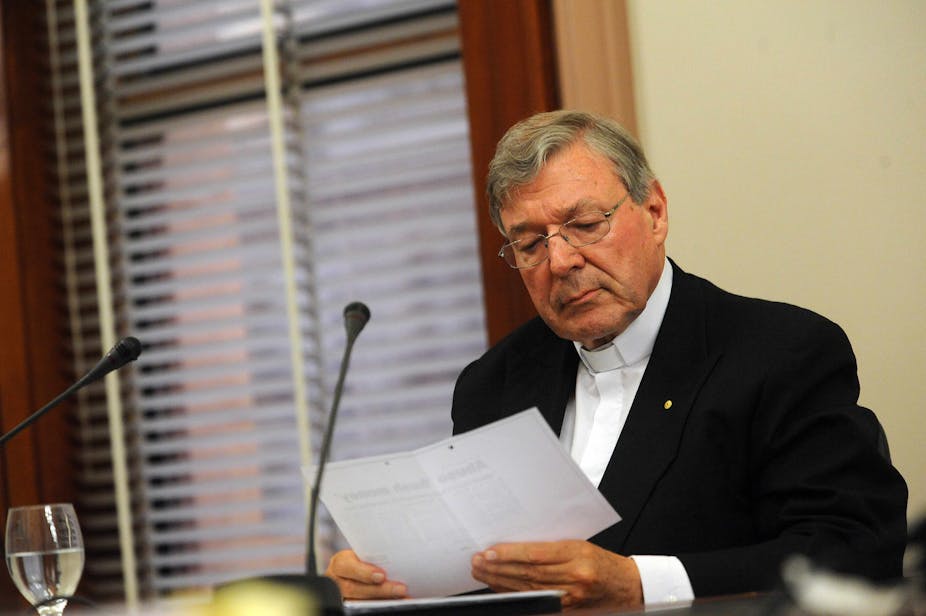Cardinal George Pell has apologised to victims and survivors of child abuse by Catholic clergy during his appearance before the Victorian parliament’s Inquiry into child abuse by by religious organisations.
Pell said he was: “fully apologetic and absolutely sorry”.
But many survivors of abuse and their families are unhappy with Pell’s testimony, especially over his stand on potential compensation for victims. And what can we expect if Pell appears before the Royal Commission into Institutional Responses to Child Sexual Abuse?
The Conversation spoke with Monash University’s Judy Courtin who attended the hearing and has written extensively on the issue of child abuse within the Catholic church.
How significant was Pell’s apology?
It was potentially a very significant apology. But if you speak to any of the victims and survivors and their families it was in fact an empty apology.
If we were to rate his performance as an actor with his apology he would have just passed as an actor. The apology, along with any empathy or compassion, was entirely lacking.
How would you assess Pell’s appearance overall?
There was a theme throughout the day, where on the one hand, George Pell would say “Yes” but it was always conditional.
He made admissions; he said there had been cover-ups by the Church; priests have been moved from parish to parish and that that is reprehensible behaviour: they were the words he used.
But then, that wasn’t a global admission. He blamed the previous Archbishop of Melbourne, Frank Little, who has since died - he was the one who destroyed documents, who covered up, who moved priest from parish to parish. It was a cold, callous stabbing in the back of his predecessor.
At the same time, there was a very strong denial that he, personally, George Pell, had not covered up; that he had not moved priests from parish to parish. He was blaming, as current Archbishop of Melbourne Denis Hart did, their predecessor. The same happened at the Diocese of Ballarat, where the current and outgoing Bishop Ronald Mulkearns, blamed the earlier bishop.
On one hand, he is saying yes, of course we will look at increasing the (Church’s) cap on ex-gratia payments to victims at the Melbourne Response.
But that was immediately followed by the claim he will only be guided by what’s deemed necessary or fair according to Victorian law and he uses the example of the Victims of Crime Assistance Tribunal, which has a cap of around about A$70,000.
When he was asked about the payments to victims in America, which are sometimes up around US$1 million, he said that wasn’t what the law is here and the Church would do what’s expected of them according to or guided by the law and legislation in Australia.
The other thing he was questioned about was his role as Cardinal. He is the only Australian Cardinal represented in Rome and as the Archbishop of Sydney, which is the most senior position, it’s the biggest Archdiocese in Australia.
Again on one hand, he is accepting his authority and his power and bathing in the glory of his authority and his power; but the very next second, he is saying, well no, I don’t really have any responsibility.
When he talked about the issue of responsibility, he relied on the structure and governance of the Church according to canon law.
Canon law gives him the authority but responsibility is limited to the individual. A parish priest is responsible for himself, but a Bishop is not responsible for his parish priest.
In terms of the Royal Commission, how will that be different, in terms of questions Pell may face?
The Royal Commission certainly has greater powers. A Victorian parliamentary inquiry does have, theoretically, powers to subpoena and sanction, but they are rarely used: they are so complex, heavy and difficult. The committee itself doesn’t have any powers to sanction someone who doesn’t appear or doesn’t produce documents, so it’s never used. The Royal Commission has very strong powers to subpoena witnesses and documentation, and criminal sanctions if they’re not carried out.
Also with the Royal Commission, the hearings will be quite adversarial. There will be forensic cross examination from very experienced and experts barristers. It will be a very different scenario.
Might Pell might come under more pressure at the Royal Commission than at the Victorian hearing?
Absolutely, all the witnesses will. So for example, Denis Hart was questioned for two to three hours, and by Victoria Police for two hours. I’d think some of these big witnesses at the Royal Commission could be there for days. It will be a much more adversarial process.

